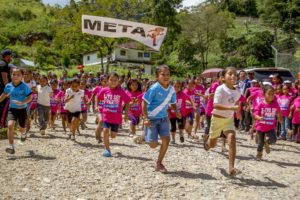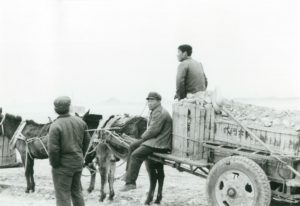
IDJ ENGLISH
『International Development Journal』 2018 October edition
NGO should be strengthened
The first meeting of the “ODA Expert Meeting” established by the request of the Foreign Minister, Taro Kono, was held on July 25, 2018 with the aim of strengthening international NGOs. Thirteen experts including international NGOs, university professors, think-tank researchers, lawyers, business people, development consultants, journalists and others took part in the meeting. I also participated as a journalist.
The Ministry of Foreign Affairs explained about the purpose of the meeting; “It is necessary to use ODA more effectively and strategically than ever within a limited budget. From that point of view, the necessity to draw out the power of various implementing entities is increasing. To that purpose, we will strengthen the agencies involved in ODA (development NGOs, private organizations, local governments, etc.) and discuss how we can share the roles.”
The first point of the issue is strengthening NGOs (funds, human resources, awareness, etc.). The second is how to implement ODA projects by diversed workers.
In the presentation on NGO assistance through ODA by the Ministry of Foreign Affairs, (1) Collaboration with Japanese NGOs by grant assistance in FY2017 is 5.07 billion yen, 113 cases. (2) The financial contribution to Japan Platform (emergency humanitarian assistance) is 5.82 billion yen for 83 cases in FY2017. (3) The grassroots technical cooperation of the Japan International Cooperation Agency (JICA) is a joint implementation project with NGOs, universities and local governments, with the results of FY2017 totaling 980 million yen, 90 cases. It is not increasing these 4~5 years. NGOs are not paid important attention within ODA. These issues will also be discussed at this conference.
Looking at the history of Japan’s ODA such as main Japanese yen loan, it was called as economic cooperation since 1950s and 60’s. To contribute to the economic reconstruction and development of Japan, the majority of them were “tied aid” received by Japanese companies. From the international community, it was criticized that “Japan’s aid is commercial assistance”.
However, as Japan became the top donor, it tried to eliminate tied aid and make them untied. But, thereafter, during long slower economic growth, Japan returned to ODA thatemphasizes national interest as symbolized by export infrastructure.
Evolution of ODA
In Japan, it seems that we are entering the era of public participation and international cooperation with citizen’s participation. So we’d better show an aspect of “Evolution of ODA”. Under such policy orientation, we also need to review and strengthen the broader roles of NGOs and NPOs in order to create a trend of international cooperation involving citizens widely.
The 3rd revision of “Development Cooperation Charter” emphasizes a wide range of “public-private partnership” as a basic concept. In order to realize this, strong collaboration with NGOs and NPOs is required to implement ODA. Especially the operating agency JICA should seriously consider collaboration not only with development consultants but also with various NGOs and NPOs. Although NGOs are certainly lacking in technical expertise, while recognizing the social strengths of NGOs, it is necessary to have a policy intention to nurture them as the strong player of international cooperation.
Turning to the United States, the US Agency for International Development (USAID) has appointed NGOs and NPOs in various stages of aid. In the United States, NGOs are called as PVO (Private Voluntary Organization) and 80-90% of emergency food aid has been implemented through PVO. Also, in Article 123 of the Foreign Assistance Act of the US, 16% of the aid cost of development assistance (agriculture, rural development, population, health and sanitation etc.) is set to be spent through NGOs.
For example, there are cases where NGOs participate in existing projects, and NGOs themselves find cases and request USAID. However, NGOs themselves should consider their own autonomy and at least 25% of the requested project costs are borne by NGOs.Since the Cold War, the US has emphasized education and health cooperation based on national strategic policies. However, it has entrusted its role to private NPOs and NGOs, not directly by the government. In that long history, NPOs and NGOs in the United States grew dynamically.
International cooperation of civilian sense
There are such historical differences in Japan and the US. However, in Japan, as the more interest in socially vulnerable people increases, the more people’s awareness of social contribution is increasing. Among them, humanitarian awareness will deepen and it will be sensitive to the consciousness of relief to the weak people both inside and outside.
In ODA projects, we should deepen the policy intention that it is not merely a government-only project but a citizen participation project. Otherwise, we will not be able to gain the support of citizens for future ODA projects. On the other hand, if NGOs and NPOs also lose their civic ideas, they will lose public support widely.
An essay contest that was held on the 50th anniversary of our company established, is a great reference for knowing the public consciousness to the recent ODA.
For example, let’s look at an essay entitled “Public-Private Partnership” on the subject. “Assistance to utilize convenience stores as social assets of developing countries to create strong regional communities that can eliminate poverty and disasters”, “ODA version of Home Improvement Tax Plan for Indonesian regional development”, “International Disaster Prevention Cooperation making full use of Japanese experiences of disasters” , “international cooperation in local urban areas”.
In order to make use of such citizen’s sense, we need to change traditional ideas and styles of ODA. Even if we try to cooperate with a wide range of citizens in the “Development Cooperation Charter”, we cannot keep up with the new trends and cannot create a new system.
Under such circumstances, the ODA Expert Meeting was held attended by Foreign Minister to think fundamentally strengthening international cooperation NGOs. Taking this opportunity, we need to deepen discussion on NGOs, in particular, why international NGOs don’t grow in Japan like Western countries and how we can develop Japanese international NGOs. I want this occasion to become a milestone for new public-private partnerships.
By Mitsuya Araki, Editor-in-chief of IDJ
***** 以下、日本語原文 *****
羅針盤 外相主導で開かれた「ODA有識者懇談会」―国際協力NGOの抜本的強化を目指して編集主幹 荒木光弥
NGO強化論
河野太郎外務大臣の要望で発足した「ODAに関する有識者懇談会」の第1回会合が2018年7月25日、国際NGOの抜本的強化を目指して開催された。委員は国際NGO、大学教授、シンクタンク研究員、弁護士、企業人、開発コンサルタント、ジャーナリストなどの有識者13人。私もジャーナリストとして参加した。
外務省によると会議の趣旨は、「限られた予算の中でODAをこれまで以上に有効かつ戦略的に活用する必要がある。その観点から、多様な実施主体の力を引き出す必要が高まっている。そのために、ODAに関わる実施主体(開発NGO、民間団体、地方自治体など)をどう強化し、役割分担していけるか討議する」としている。
その論点の第1は、NGOの抜本的強化(資金、人材、認知度など)。第2は多様な担い手によるODA事業実施のあり方などである。
外務省によるODAを通じたNGO支援の現状紹介では、(1)わが国NGOとの連携無償資金協力は2017年度で50憶7,000万円の規模で、113件。(2)ジャパン・プラットフォームへの拠出金(緊急人道支援)は2017年度58憶2,000万円で、83件。(3)国際協力機構(JICA)の草の根技術協力はNGO、大学、自治体との共同実施事業で、2017年度実績(NGO)は9億8,000万円、90件で、ここ4~5年、ほとんど伸びていない。
どう見てもODAの中でNGOは、重視されているとは言い難い。こうした問題も今回の会議で議論されることになろう。わが国のODAの歴史をみると、1950-60年代から、ODAは円借款協力を中心に経済協力と称された。日本の経済復興そして発展に寄与すべく、その大半は日本企業が受注するタイド(ヒモ付き援助)だった。国際社会からは「日本の援助は商業援助だ」と非難された。
だが、その後、トップドナーになるにつれてヒモ付き撤廃(アンタイド化)に努力した。しかし、その後、長い低成長の中、再びインフラ輸出に代表されるように国益重視のODAへ戻った。
進化するODA
日本もここらで、“進化する援助”の一面を見せるべく、国民参加、市民参加型の国際協力を目指す時代を迎えているのではないか。私たちは、そうした政策指向の下で、広く市民を巻き込んだ国際協力の流れをつくる上でも、NGO、NPOの幅広い役割を見直し、強化する必要があろう。
第3回改定の「開発協力大綱」も、基本コンセプトとして幅広い「官民連携」を強調している。これを実現するためにも、ODA実施にNGO、NPOとの強い連携が求められる。特に実施機関JICAは、開発コンサルタントのみならず、多様なNGO、NPOとの連携を真剣に検討すべきである。たしかにNGOは専門的な技術力に欠けるところはあるが、NGOの社会的な強みを認識し、彼らを援助の戦力として育てるという政策的意図が必要であろう。
目を米国に転じると、国務省の米国際開発庁(USAID)は援助の色々な局面でNGO、NPOを登用している。米国ではNGOをPVO(Private Voluntary Organization)と呼び、無償の緊急食糧援助の80~90%がPVOを通じて実施されてきた。また、米国の対外援助法123条では開発援助(農業、地方開発、人口、保健衛生など)の援助費のうち16%はNGOを通じて支出するよう定められている。
たとえば、NGOが既存のプロジェクトに参加するケースと、NGO自らが案件を発掘してUSAIDに要請するケースなどがある。ただし、NGO自ら発掘した案件はNGOの自主性を重視して要請案件コストの25%はNGOの自己負担にしているという。
米国は冷戦時代から国家戦略的な政策にもとづいて、教育や保健医療協力を重視してきた。だが、それは政府直轄ではなく、民間NPO、NGOにその役割を委託してきた。その長い歴史の中で、米国のNPO、NGOが大きく育った。
市民感覚の国際協力
日米にはそうした歴史的違いがある。だが、日本も後発ながら社会的弱者への関心度が高まるにつれ、市民の社会貢献への意識も高まっている。なかでも人道意識も深まり、内外にわたる弱者への救済意識にも敏感になっているだろう。
ODA事業においても単に政府だけの事業ではなく、国民参加、市民参加の事業であるという政策的意図を深めていくべきだ。そうしないと、これからのODA事業への国民、市民の支持を得られなくなるだろう。一方、NGO、NPOも市民的発想を失ったら、広く国民の支持を失うだろう。
最近のODAに対する国民意識、市民意識を知る上で、本誌創刊50周年で募集した小論文コンテストが大きな参考になる。 たとえば、「官民連携」というテーマで応募があった小論文を見てみよう。 「コンビニを開発途上国のソーシャルアセットとして活用し、貧困や災害に負けない強い地域共同体の創造を図る援助」、「インドネシア地方開発のためのODA版ふるさと納税制度」をはじめ、「日本の災害援助体験を生かした国際防災協力」、「地方都市部の国際協力がわが国の未来に希望をつなぐ」などがある。
こうした市民感覚を生かすには、これまでの伝統的な援助思想や形態、実施機関の古き援助スタイルやシステムでは、新しい時代に対処できない。「開発協力大綱」で幅広い国民との連携を唱えても、ODAの現場が思考停止状態では、新しい流れに対応できないし、新しい流れを創れない。
そうした中、外相自ら出席して「国際協力NGOの抜本的強化」を考える有識者懇談会が催された。これを機に、なぜ国際協力分野のNGOが欧米のように育たないか、どうしたら日本の国際NGOを育てられるか、議論を深め、新しい官民連携への一里塚になってもらいたい。
こうした市民感覚を生かすには、これまでの伝統的な援助思想や形態、実施機関の古き援助スタイルやシステムでは、新しい時代に対処できない。「開発協力大綱」で幅広い国民との連携を唱えても、ODAの現場が思考停止状態では、新しい流れに対応できないし、新しい流れを創れない。
そうした中、外相自ら出席して「国際協力NGOの抜本的強化」を考える有識者懇談会が催された。これを機に、なぜ国際協力分野のNGOが欧米のように育たないか、どうしたら日本の国際NGOを育てられるか、議論を深め、新しい官民連携への一里塚になってもらいたい。
『国際開発ジャーナル』主幹 荒木 光弥



